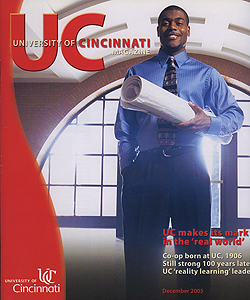by Deborah Rieselman
Although real-world learning at the University of Cincinnati has many benefits, the opportunity to stand up for social justice is drawing more and more students to the College of Law's recent offerings.
"More of our students come in with an interest in seeing justice done, seeing right prevail," says associate dean Barbara Watts, MA (Ed) '69, JD '78. "They're eager to roll up their sleeves and begin doing the right thing."
The state of Ohio allows third-year law students to work with real clients under direct supervision of an attorney. The College of Law offers its students three types of real-client experiences:
The Innocence Project -- The national program works to exonerate the wrongfully convicted through post-conviction DNA testing and evidence that can conclusively prove innocence. UC students had their first victory early last year when Gary Reece walked away from prison after serving 25 years of a 75-year sentence for the rape and attempted murder of a woman in his apartment building. No forensic evidence ever tied Reece to the case to begin with, and four UC students spent a year and a half developing new evidence. Their efforts included bringing a prominent forensic investigator into the case and establishing that the rape victim had a history of self-mutilation.
Domestic Relations/Domestic Violence Clinic -- UC students represent clients seeking relief from domestic violence or legal assistance with child support, child custody and visitation. New to the college this year, the clinic is operated in partnership with the Legal Aid Society of Greater Cincinnati.
Appellate Practice Clinic -- Possibly the first program of its kind in the Midwest, the new clinic lets student teams spend a year working on appeal cases for indigent defendants and argue before the court. The firm Squires, Sanders and Dempsey pays for attorney Pierre Bergeron to work with the students one day a week. This fall, the students won a motion to keep an immigrant from being deported while his appeal was pending.
The appellate clinic lasts a year so students "see all the aspects of the appeal from beginning to the end," Bergeron says. "It's kind of daunting when you first take a case on appeal. I don't want the students to be intimidated. I want them to be comfortable with the whole process."
Roughly 27 percent of upper-class law students participate in the optional real-world experiences, Barbara Watts estimates. "They feel good about helping people while they're learning. It's a lot of work, but it's compelling, engaging work. And it's amazing to see how devoted they become."
Reality learning becoming UC's brand of education
CCM student hobnobs with artists
Faculty major key to "real world" programs
Links:
UC's experiential learning opportunities
UC law students on A&E network
Business students create Delta "experience"
Center for Design, Research and Innovation

